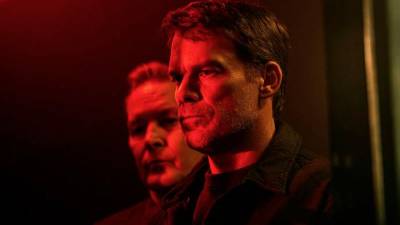Now 19 years old, the Dexter television franchise has gone through five great early seasons and three progressively terrible ones in its original run from 2006 to 2013, one middling “miniseries” in 2022, one now-cancelled prequel season from earlier this year and the latest entry, Dexter: Resurrection that is certainly a resurrection, in more ways than one.
After being shot by his son and slipping into a coma in Iron Lake, Dexter Morgan (Michael C. Hall) awakes several weeks later to find Harrison (Jake Alcott) has left the town. In the middle of physical rehab, former colleague and Miami Metro Police Department Homicide Captain Angel Batista (David Zayaz) appears, carrying with him a strong suspicion that Dexter is the infamous serial killer, the Bay Harbour Butcher.
In New York, Harrison’s new life as a hotel bellhop is compromised when the “dark urges” inherited from Dexter causes him to stop a woman from being raped, which spirals out of control when he kills and dismembers the rapist.
The hastily discarded body parts eventually end up being discovered at a trash dump site, making not only the regional news, but also placing Harrison in the crosshairs of the New York Police Department’s best detectives.
Realising the danger Harrison has put himself in, Dexter makes his way to New York City to save his son, with Angel hot on his heels. However, once in The Big Apple, Dexter realises he is not the only serial killer in the city.
Sharper writing, bolder choices
A return to form for the series, Resurrection is a well-thought out course correction for where Dexter’s original run and 2022’s New Blood took its characters. Their mishandling and odd creative choices is largely absent from the revived series.
Showrunner Clyde Phillips’s choice to reverse the creative decisions made on those seasons is a welcome one and certainly something fans have always been asking for, particularly when it comes to Dexter’s growth as a character.
This is most evident with Dexter’s final scenes with Leon Prater (Peter Dinklage), where he acknowledges that his homicidal urge to kill other serial killers and his need for bringing justice and protecting the weak are not mutually exclusive, or the monologue at the end of the season, where he admits that his connection with loved ones will help him be more human. Even Harrison is fleshed out as a proper character, with an actual direction on where the franchise will take him, rather than being the uneven oddity he was in New Blood. Additionally, related to that, Angel’s pointless cameo from the limited series has brought him back in an expanded capacity for an emotional reunion with Dexter.
Ambitious world-building
It also has to be pointed out that Resurrection might be the first season in the totality of the franchise to completely shake up the standard Dexter storytelling formula. The season starts with a rapist being chopped into nine parts and ends with a secret killer cabal bankrolled by a billionaire being dismantled.
Though there are no details on the budget for the new season, it has to be monumental due how said cabal comprises of characters played by Krysten Ritter, David Dastmalchian, Neil Patrick Harris, Marc Menchaca and Eric Stonestreet. Not to mention all the cameos of actors reprising their roles from the original eight seasons.
Cameos are typically distracting, but Phillips somehow pulled it off by sensibly inserting the minor appearances in small sections while giving bigger screentimes to the more important new characters, which in turn expanded the world of Dexter.
Refreshing at multiple levels, Resurrection is a much needed revitalisation of a franchise that began in the mid-2000s and has appropriately adapted to the tastes of an audience who are just as similarly two decades older. Like its titular character, the show proves to be a police-evading, serial killer-killing beast that has grown not only older but more complex with the passage of time.
